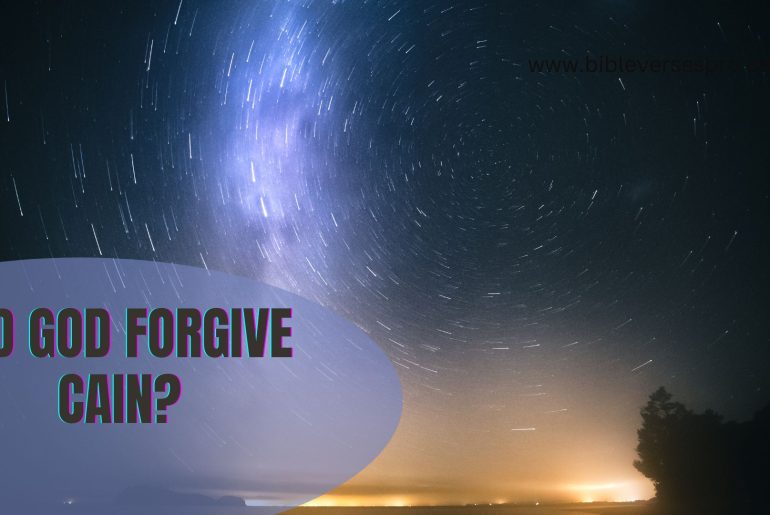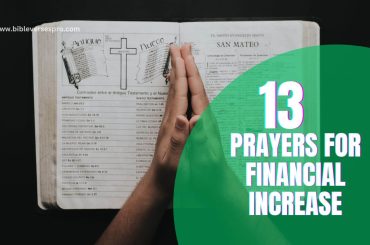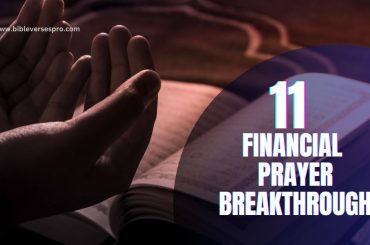The story of Cain and Abel, found in the Book of Genesis, has captivated readers for centuries.
At its heart lies a profound moral dilemma: did God forgive Cain? the narrative offers valuable insights into the nature of divine mercy and human responsibility.
This article delves into the complexities of Cain’s situation and explores the interpretations surrounding God’s response.
Did God Forgive Cain?
No. He did not. The Bible makes it quite plain that Cain’s sin of murdering his brother was not the determining cause of God’s refusal to forgive him.
God considered his lack of repentance and decided not to pardon him. However, based on the account in Genesis 4:13-16, it appears that God showed mercy to Cain by sparing his life and protecting him from harm after he had committed the grave sin of murder.
God’s response to Cain’s fear and plea for protection suggests a measure of leniency, as He put a mark on Cain to prevent others from harming him.
Whether this protection can be interpreted as complete forgiveness is a matter of theological interpretation and belief.
Some may argue that God’s actions indicate a form of forgiveness or mercy, while others may view it as God’s desire to ensure that Cain faces the consequences of his actions while still providing him some level of protection.
The Sin of Cain:
Cain’s sin of killing his brother Abel was a pivotal event in human history, marking the emergence of evil and the first instance of murder.
His jealousy and anger towards Abel’s favor with God led him to commit this grave transgression.
The Bible portrays Cain’s act as a clear violation of God’s commandments, and his actions brought about devastating consequences.
Divine Confrontation and Mercy:
When God confronted Cain after the murder, Cain’s response indicated a mixture of defiance and fear.
Although God did not immediately strike Cain down for his crime, the reason for this apparent mercy is open to interpretation.
Some argue that God spared Cain’s life to allow him the opportunity for repentance, while others see it as an expression of God’s mercy, not wanting to see any more bloodshed.
The Mark of Cain: Symbolism and Interpretations:
The “mark of Cain” has been the subject of various interpretations throughout history. Some believe it was a physical mark, visible to others as a sign of divine protection.
Others interpret it metaphorically, representing a change in Cain’s character or even a reminder of his guilt.
Alternatively, some see it as a mark of judgment, indicating that Cain would bear the consequences of his actions throughout his life.
Divine Justice and Human Responsibility:
The story of Cain and Abel raises profound questions about the nature of divine justice and human responsibility.
God’s mercy toward Cain does not negate the concept of divine justice; rather, it demonstrates the complex interplay between justice and mercy in the divine nature.
This balance between justice and mercy is a recurring theme throughout the Bible, where divine forgiveness often requires genuine remorse and repentance on the part of the sinner.
Lessons for Humanity:
The story of Cain and God’s response holds important lessons for humanity:
a) The Reality of Sin: Cain’s actions illustrate the dark reality of sin and its potential consequences. It serves as a cautionary tale, warning us about the destructive power of jealousy, anger, and other sinful emotions.
b) God’s Mercy and Compassion: God’s willingness to spare Cain’s life, despite his heinous crime, demonstrates divine mercy and compassion. It shows that God’s desire is not to see sinners perish but to give them opportunities for redemption and restoration.
c) The Call for Repentance: Cain’s story emphasizes the necessity of repentance and transformation. Genuine remorse and a willingness to turn away from sin are essential for receiving God’s forgiveness.
d) The Complexity of Divine Forgiveness: The story of Cain reminds us that divine forgiveness is not a simple matter.
It involves an intricate interplay of justice, mercy, and human response. God’s forgiveness is not unconditional; it requires a sincere change of heart and a commitment to righteousness.
How Did God Punish Cain?
After Cain committed the sin of killing his brother Abel, God confronted him about his actions.
While God did not take Cain’s life as immediate punishment, He did pronounce a form of punishment for his crime. In Genesis 4:11-12, God said to Cain:
“Now you are cursed from the ground, which has opened its mouth to receive your brother’s blood from your hand. When you work the ground, it shall no longer yield to you its strength. You shall be a fugitive and a wanderer on the earth.”
- The Curse from the Ground: God cursed the ground that Cain worked on, indicating that the land would no longer yield its full potential to him. This curse implied that Cain’s efforts at farming and agriculture would be less productive and fruitful than before.
- A Fugitive and Wanderer: God also decreed that Cain would become a fugitive and a wanderer on the earth. This punishment meant that he would be driven away from his family and homeland, becoming a nomadic outcast with no settled place to call his own.
- Fear of Retribution: Additionally, Cain expressed fear that whoever found him would kill him (Genesis 4:14). God’s protection of Cain by placing a mark on him (Genesis 4:15) was likely in response to this fear, preventing others from exacting immediate vengeance upon him.
These punishments demonstrate the seriousness of Cain’s sin and the consequences of his actions.
While God did not take Cain’s life, He ensured that Cain faced the repercussions of his crime by imposing curses and forcing him into a life of wandering and isolation.
This story also serves as a reminder of the far-reaching consequences of sin and the importance of seeking reconciliation with God and others through genuine repentance and remorse.
What Does The story of Cain and Abel?
The story of Cain and Abel is a significant narrative found in the Book of Genesis, the first book of the Bible.
It is a tale of sibling rivalry, jealousy, murder, and the consequences of sin. The story unfolds in the following manner:
1. Cain and Abel’s Offerings: Cain and Abel were the sons of Adam and Eve, making them the first two children born on Earth according to the biblical account.
The brothers grew up with distinct occupations: Abel became a shepherd, while Cain worked the land as a farmer. As an expression of their devotion to God, they both brought offerings to present to Him.
2. God’s Acceptance and Rejection: God accepted Abel’s offering, which consisted of the best of his flock.
However, He did not accept Cain’s offering of fruits and vegetables from the ground. The exact reasons for God’s acceptance and rejection are not explicitly stated in the text, leading to various interpretations.
Some believe it was about the quality of the offerings, while others suggest it may have been about the brothers’ attitudes or motives.
3. Jealousy and Murder: When Cain realized that God favored Abel’s offering over his, he became consumed with jealousy and anger. In a fit of rage and resentment, Cain invited Abel into the field and killed him.
4. God’s Confrontation and Punishment: After the murder, God confronted Cain, asking about Abel’s whereabouts.
In response, Cain tried to hide his crime, saying, “Am I my brother’s keeper?” However, God already knew what had transpired. God then pronounced the curses on Cain, as mentioned in the previous response, condemning him to a life of hardship and wandering.
5. Cain’s Mark and Protection: As Cain expressed fear that others might seek vengeance on him, God marked him with a protective sign, preventing anyone from harming him. The precise nature of this mark remains a subject of speculation and interpretation.
The story of Cain and Abel serves as a cautionary tale about the consequences of envy, jealousy, and uncontrolled anger.
It highlights the destructive nature of sin and its impact on individuals and relationships. Additionally, it emphasizes the importance of offering sincere and acceptable worship to God.
What is The Main Lesson Of Cain and Abel’s Story?
The main lesson of Cain and Abel’s story is the destructive power of sin and the importance of controlling negative emotions, such as jealousy and anger. The narrative serves as a cautionary tale with several key lessons:
- Consequences of Sin: The story highlights the devastating consequences of sin and the far-reaching effects it can have on individuals and relationships. Cain’s jealousy and unchecked anger led him to commit the grave sin of murdering his own brother. It shows that sin can lead to irreversible actions that bring pain and suffering.
- God’s Justice and Mercy: The story underscores the balance between God’s justice and mercy. While God punished Cain for his sin, He also showed restraint by sparing his life and protecting him from immediate retaliation. This demonstrates that God’s mercy is available even to those who have sinned but need to face the consequences of their actions.
Conclusion
The Bible makes it quite plain that Cain’s sin of murdering his brother was not the determining cause of God’s refusal to forgive him.
While God showed restraint and mercy in not immediately punishing Cain, the story of Cain and Abel highlights the profound consequences of sin and the importance of genuine repentance.
It reminds us that divine forgiveness is not a license to disregard moral responsibility but a call to seek reconciliation with both God and our fellow human beings.






